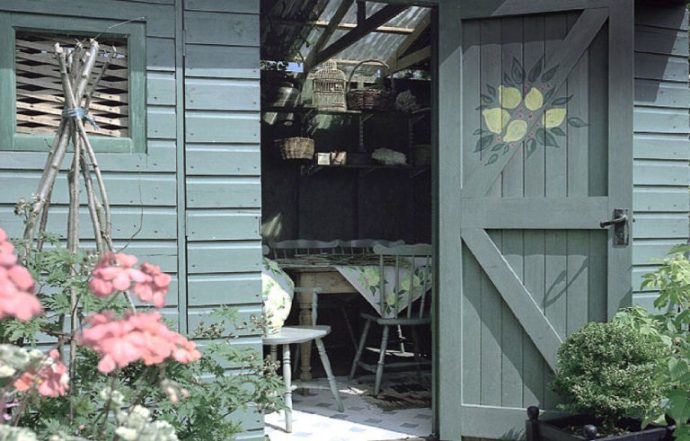Colour is everywhere and affects our mood and perception of things.
The garden is usually awash with colour during spring, summer and autumn but when the grey of winter hits, colour disappears.
In winter, as plants slumber, it can feel cold and miserable. Grey skies for days on end, rain and a chilly wind can make us feel a little low.
What contributes to this is when we look out of our window and see a garden devoid of colour.
But you can stop your garden looking drab this winter with bold colour paints and coloured pots, as well as some clever winter planting.
Your garden is a stage

Image Source
Think of your garden as being the stage on which the actors – the plants and pots – tell their story all year round. But all too often the kinder seasons of spring, summer and autumn are responsible for plants, shrubs and flowers blossoming.
Creating a backdrop to your stage is important. A garden designer will tell you the importance of having a backdrop against which your garden can blossom and grow throughout the year.
And adding colour is important. This is how you can do it;
Accessories and furniture – Rattan furniture for the garden is stylish, even more so when you add weather-proof accessories such as rugs and cushions. For a re-vamped seating area, add coloured lanterns too.
Colourful pots – a quick and easy way to give your winter garden an instant lift is to plant evergreen plants in coloured pots. The range of sizes and colours is vast, but like interior design, we suggest having a colour palette of two colours and a third accent colour to be used sparingly. Group pots together for maximum impact.
Paint fences and walls – again, the range of outdoor paints and stains is growing all the time. We are loving the chalky colours, as well as the not-overly bright mustard yellow fence paint. Again, bear in mind the colours you will use with pots and furniture and make sure the paint forms the perfect backdrop to it.
Paint when the sun shines

Image Source
Just a quick note about painting outdoors.
Winter is NOT the time to give the garden a lick of paint, unless the temperatures are relatively barmy and the rain is holding off. Night time frosts can stop the paint from drying properly and you may find that as the sun begins to warm in spring, that your paint begins to peel.
To get the best results from painting and staining, always;
- Check the weather and opt for a day when rain is not forecast for at least six hours.
- Paint in the warmer months of spring and summer, when the danger of night time frosts has passed.
- Lighter colours will be vibrant all year around but cooler and darker colours will be muted when the skies are grey in winter
How to use colour

Image Source
The plants in your garden, their flowers and foliage are the actors on your stage and as such, the backdrop should allow them to shine.
There are plants that are perfect for every spot in the garden and if you are thinking of adding colour, this is the best way of doing it…
- Some colours work better together than others – have a look at a simple colour wheel for help in choosing which colours to mix and match:
- Colours opposite each other on the wheel look great together, complimenting each other.
- Colours that lie next to each other create more of a contrast; try planting orange flowers and red flowers, in various shades, together in one spot.
Daylight affects how we see colours – this is important because what looks bright at mid-day will fade when dusk starts to fall. Cooler, lighter colours can look almost white in bright sunshine, but take on a deeper hue in dusk.
Colour affects how much sun a plant can thrive in – not all plants love bright sunshine and no shade whereas other plants do. Cleary, read the instructions when planting seedlings and so on but, as a general rule of thumb, bright yellow, orange and red flowering plants love sunshine, whereas cooler coloured flowers prefer partial or full shade.
Non-flowering shrubs work well too – there are many non-flowering shrubs that have pretty foliage that add colour to a garden. Variegated foliage is when there are different shades of green in the leaf, with some shrubs enjoying dark red foliage in autumn or red tinged leaves.
With a range of stylish, practical and affordable garden furniture, Rattan Direct have everything you need to add colour and style to your garden.
Main Image Source





